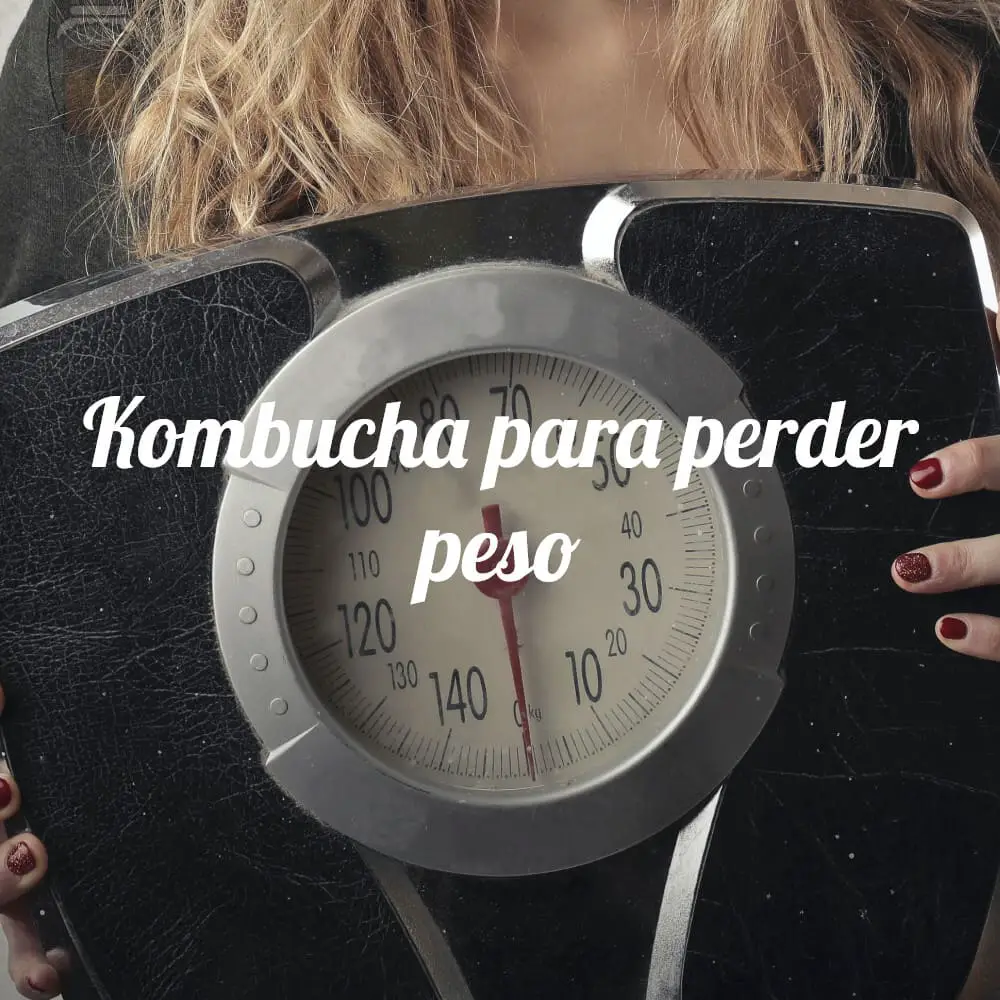It has become evident among consumers that kombucha shows an excellent effect on losing weight. However, some studies are not so specific if it has been shown that it can achieve weight loss, so it has become one of the most popular options to obtain benefits not only in health but also to obtain the desired physique.
And in this article, we will see in detail what happens in the body and how the processes are happening.
Contents
Is kombucha good for weight loss?
The short answer is yes, but if we understand this a little more, we will see that kombucha has a composition of nutrients that intervenes in the metabolism generating many beneficial effects on health. One of the best-known is weight loss.
Kombucha can lower lipid and blood sugar levels, provide antioxidants that support weight loss, stimulate fat burning in tissues, improve digestion, increase metabolic rate, and offer a low carbohydrate content. [1] [2]
It has also been observed that kombucha can decrease cravings for more food. Apparently, this is because it can suppress appetite or generate a feeling of a «full stomach» by the volume of liquid consumed. In this way, it helps weight loss by reducing the consumption of calories and nutrients. [3]
How does body fat decrease?
Kombucha contains acetic acid, which tends to inhibit the accumulation of corporal fat.
Studies with obese people showed that daily intake of acetic acid can decrease body weight, visceral fat, and waist circumference. Consuming kombucha in a small portion a day could help with this.
Remember that you can go to the post about the recommended dosage of kombucha here.
Kombucha also shows antilipidemic properties to help lower cholesterol and triglyceride levels in the blood. [2] [4]
Acetic acid is produced by kombucha during fermentation. It is in good quantity at the end of it. Still, if it lasts more than 1 or 2 weeks, it could be so acidic that it would bring adverse side effects such as dental erosion or gastrointestinal lesions in sensitive people. [5]
Do probiotics have any effect?
Probiotics have the potential to aid in weight loss and decrease body fat in obese and overweight people. While there are doubts about how much kombucha can intervene, it is believed to affect this positively.
Obese people have an imbalance of the intestinal flora that impairs the correct absorption of nutrients and generates metabolic disorders, resulting in endocrine alterations, energy balance, lipid metabolism, and mild systemic inflammation, as we have discussed in topics such as the relationship between kombucha and constipation.
The consumption of probiotics would imply the recovery of the flora and an improvement in digestion, helping to prevent the appearance of all those alterations that contribute to the maintenance or development of obesity, apparently creating a promising means to promote weight loss. [6] [7]
Even so, it is believed that this effect on weight and body mass index may be limited. In addition, more studies are needed that indicate better strains, doses, and time of consumption. [6] [8]
The role of kombucha polyphenols
Consuming foods containing certain polyphenols may change lipid and energy metabolism and thus prevent weight gain. However, if it is not consumed excessively, it will not generate adverse health effects.
It has been proven that green or white tea can provide catechins, blueberries can give you anthocyanins, red grapes resveratrol, and spices such as turmeric offer curcumin.
These foods, in combination with kombucha, may increase their effects on weight loss. I find it interesting to cite my article on kombucha flavorings.
These foods improve blood glucose and lipid profiles by decreasing insulin resistance, fat accumulation, and obesity.
While these effects have been proven, studies that confirm their long-term effects still need to be completed. However, including them in a healthy diet will allow you to obtain results to prevent obesity and maintain an ideal weight. [9] [10]
How to drink kombucha for weight loss?
The first thing you should keep in mind is the recommended dose, which we mentioned in previous sections. Still, it is also interesting that you can look at the best times of day to drink kombucha and how to combine it with physical exercise.
On the other hand, it is also essential to verify its sugar content since several kombuchas on the market have a high percentage of sugar, which will take you away from the goal of losing weight, so you should inform yourself about the sugar content of kombucha and how to control it with fermentation. [11]
Another point to consider is the carbonation of the drink. Kombucha should not be very carbonated since the carbon dioxide (CO2) produced stimulates the release of ghrelin, which favors weight gain and increases the feeling of hunger, leading to a greater need to consume more food. [12] [13]
Therefore, it is not recommended to do a second fermentation if you will use kombucha for a weight loss diet.
Gaining weight by drinking kombucha
Kombucha is ideal for having a low-sugar content drink. Still, you should be careful since, as I mentioned, various brands have different amounts of sugar.
Kombucha contains around 30 calories and 2 to 8 grams per 240ml drink. Although it is much less than other soft drinks, it can still impact weight gain if consumed daily and more than once a day.
The above is essential when you drink kombucha when practicing intermittent fasting or the ketogenic diet, as kombucha is not considered a keto product.
Even so, it can be worse if kombucha is consumed exceeding 240ml or beyond 400ml, further increasing caloric intake with food which would lead not only to obesity but also to health problems or aggravate pathologies already present. [17]
Another point to consider is that fructose in excess may be related to an increase in obesity, metabolic syndrome, and fatty liver. Kombucha contains fructose, but its content may vary depending on the fermentation time. [18]
As long as you drink kombucha in safe amounts per day and the sugar content does not exceed 30 calories, you will not have adverse effects that outweigh the anti-obesity benefits of the drink.
Kombucha with other ingredients to improve weight loss.
Kombucha prepared with specific ingredients can improve its effects on weight. A good strategy is to change the black tea used as a base to make kombucha for green tea, which has been shown to improve HDL levels and decrease the risk of obesity.
This means that mixing both would help potentiate its effects against weight gain, likely heavily influenced by increased polyphenol content in kombucha. [19]
Other ingredients that can be added to improve your ability to reduce weight are pineapple, ginger, cayenne pepper, or chia seeds, which through the contribution of certain nutrients and fiber, can stimulate fat burning, accelerate metabolism and reduce hunger.
The probiotics in kombucha can help absorb the nutrients in these foods, ensuring or enhancing their effects on weight.
There is also an auspicious combination of kombucha with sea grapes (C. racemosa). In some studies, it was shown that it can reduce cholesterol, triglycerides, and LDL (low-density lipoprotein) while increasing HDL (high-density lipoprotein) in rodents, although it is believed that it could have the same effects in humans. [20]
Need more content? Here you go
[1] https://pubmed.ncbi.nlm.nih.gov/7369170/
[2] https://www.ncbi.nlm.nih.gov/pmc/articles/PMC3403982/
[3] https://academic.oup.com/cdn/article/5/Supplement_2/377/6293420?login=false
[4] https://pubmed.ncbi.nlm.nih.gov/19661687/
[5] https://www.ada.org.au/News-Media/News-and-Release/Latest-News/Should-we-put-more-focus-on-the-message-of-beverag
[6] https://www.ncbi.nlm.nih.gov/pmc/articles/PMC8540110/
[7] https://pubmed.ncbi.nlm.nih.gov/30987812/
[8] https://www.sciencedirect.com/science/article/abs/pii/S0271531715001037
[9] https://www.ncbi.nlm.nih.gov/pmc/articles/PMC3257683/
[10] https://www.ncbi.nlm.nih.gov/pmc/articles/PMC5452182/
[11] https://www.paeats.org/feature/babas-brew-kombucha-sports-drink/
[12] https://www.sciencedirect.com/science/article/abs/pii/S1871403X17300066
[13] https://www.health.harvard.edu/blog/zero-weight-loss-from-zero-calorie-drinks-say-it-aint-so-2021032222204
[17] https://www.ncbi.nlm.nih.gov/pmc/articles/PMC3840121/
[18] https://onlinelibrary.wiley.com/doi/abs/10.1111/j.2047-6310.2013.00171.x
[19] https://www.sciencedirect.com/science/article/abs/pii/S0031938405004488
[20] https://www.researchgate.net/publication/360221436_Kombucha_drink_enriched_with_sea_grapes_Caulerpa_racemosa_as_potential_functional_beverage_to_contrast_obesity_An_in_vivo_and_in_vitro_approach

